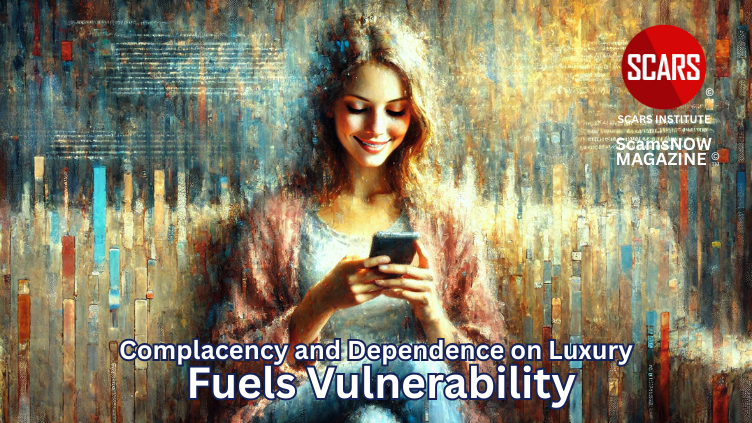Complacency and Dependence on Luxury Fuels Vulnerability in Scam Victims
The Allure of Comfort: How Societal Complacency Fuels Vulnerability to Scams and Cybercrime
Primary Category: Psychology of Scams
Intended Audience: Scam Victims-Survivors / Family & Friends / General Public / Others
Author:
• Tim McGuinness, Ph.D., DFin, MCPO, MAnth – Anthropologist, Scientist, Polymath, Director of the Society of Citizens Against Relationship Scams Inc.
About This Article
There is a direct line between Tacitus’s ancient warnings about luxury-induced complacency and today’s public indifference toward scams and cybercrime. In a world saturated with comfort, convenience, and digital ease, many people have become so accustomed to their lifestyle that they fail to recognize or prepare for the threats that surround them. Just as Tacitus observed how the Roman Empire lulled conquered populations into submission through luxuries disguised as civilization, modern individuals are lulled into vulnerability through overconfidence, digital dependency, and a false sense of security.
The rise of cybercrime, particularly during global disruptions like the COVID-19 pandemic, has revealed how quickly attackers can exploit not only technology, but also human complacency. Emotional comfort and material ease create blind spots—making people less likely to report fraud, question suspicious activity, or take protective action. But this complacency can be overcome. Awareness, education, collaboration, and renewed commitment to personal vigilance are necessary to interrupt the cycle.
Tacitus’s insights remind us that true safety and freedom are not found in ease and luxury, but in clarity, discipline, and the courage to remain alert in the face of threats—whether ancient or digital.

The Allure of Comfort: How Societal Complacency Fuels Vulnerability to Scams and Cybercrime
In an era marked by unprecedented technological advancement and material abundance, societies worldwide revel in comforts that previous generations could scarcely imagine. This widespread access to luxury and convenience, while a testament to human progress, may also breed a subtle yet perilous complacency. The Roman historian Tacitus observed that the seduction of luxury could lead to societal decay, a notion that resonates profoundly in today’s context of escalating scams, fraud, and cybercrime. As individuals become increasingly ensnared by the trappings of modern comfort, there is a growing tendency to underestimate or even disregard the looming threats posed by digital malfeasance.
Tacitus on Luxury and Moral Decline
Tacitus, renowned for his critical analyses of Roman society, chronicled how the empire’s expansion and ensuing affluence led to moral and civic deterioration. He contended that the conquered peoples, once vigorous and self-reliant, became enfeebled by the luxuries introduced by their Roman conquerors. This indulgence in comfort eroded their virtues of discipline and vigilance, rendering them susceptible to domination. Tacitus lamented the loss of traditional Roman values, attributing the empire’s decline to the corrupting influence of wealth and the populace’s ensuing passivity.
Modern Parallels: Complacency in the Face of Digital Threats
The contemporary landscape mirrors Tacitus’s observations, albeit in a digital realm. The proliferation of smart devices, online services, and instant gratification has fostered a culture deeply reliant on technology. While these advancements offer unparalleled convenience, they also cultivate a false sense of security. Many individuals, ensconced in their digital comforts, operate under the assumption that they are insulated from cyber threats. This overconfidence manifests in lax security practices, such as weak passwords, neglecting software updates, and indiscriminate sharing of personal information online. Such behaviors are emblematic of a populace that, much like Tacitus’s contemporaries, has grown complacent amidst luxury, inadvertently opening the door to exploitation.
The Psychology of Overconfidence and Vulnerability
Overconfidence in one’s immunity to scams and cybercrime is a significant contributor to vulnerability. This psychological phenomenon leads individuals to underestimate risks and overestimate their ability to navigate digital spaces safely. Research indicates that both young adults and the elderly are particularly susceptible to cybercrimes, often due to overestimating their digital literacy or trusting nature. This misplaced self-assurance can result in inadequate precautionary measures, making individuals easy targets for cybercriminals.
The Role of Dependence on Technology
Our increasing dependence on technology parallels the Romans’ indulgence in luxury. As daily activities become more intertwined with digital platforms, the potential impact of cyber threats intensifies. The convenience of online banking, social media, and e-commerce, while beneficial, also means that a single security breach can have far-reaching consequences. This reliance, coupled with a lack of vigilance, mirrors the scenario Tacitus described, where comfort led to vulnerability and, ultimately, subjugation.
The Escalation of Cybercrime
The COVID-19 pandemic underscored the adaptability and opportunism of cybercriminals. As individuals increasingly turned to online platforms for work, shopping, and social interaction, cybercriminals exploited this shift. Phishing attacks surged by 220%, with fraudsters posing as government officials, health authorities, or delivery services to deceive individuals into divulging sensitive information. This exploitation of fear and uncertainty highlights the critical need for heightened awareness and proactive security measures.
The Imperative for Vigilance and Education
Addressing this pervasive complacency requires a concerted effort to cultivate a culture of vigilance and continuous education. Individuals must be encouraged to question the security of their digital practices and seek out knowledge on emerging threats. Educational initiatives should aim to demystify cybersecurity, making it accessible and actionable for all demographics. By fostering an environment where caution is valued over convenience, society can begin to mitigate the risks associated with our digital dependencies.
Collaborative Efforts to Combat Cybercrime
Combating the scourge of cybercrime necessitates collaboration between individuals, industry leaders, and public sector entities. Operational partnerships can enhance the detection and disruption of cybercriminal networks, increasing the difficulty and risk associated with executing cybercriminal activities. By sharing information, resources, and strategies, these collaborations can create a unified front against the evolving tactics of cyber adversaries. World Economic Forum
Conclusion
Tacitus’s reflections on luxury and societal decline serve as a timeless cautionary tale. In our modern context, the comforts and conveniences afforded by technological advancements have engendered a complacency that cybercriminals are adept at exploiting. Recognizing the parallels between past and present, it becomes imperative to balance our embrace of luxury with a steadfast commitment to vigilance. By acknowledging our vulnerabilities, educating ourselves and others, and fostering collaborative defenses, we can resist the descent into digital subjugation and safeguard the integrity of our increasingly interconnected lives.
Reference: Who Was Tacitus
Tacitus was a Roman historian and senator who lived during the 1st and early 2nd centuries AD (approximately 56 – 120 AD). He is best known for his works Annals and Histories, which document the history of the Roman Empire, particularly the reigns of emperors such as Tiberius, Nero, and others. Tacitus is regarded as one of the greatest Roman historians, notable for his concise and powerful style and his sharp critique of imperial corruption and moral decline.
On Enslavement to Luxury
Tacitus repeatedly criticized the Roman elite’s moral decay, especially their addiction to luxury, comfort, and excess, which he saw as both a symptom and a cause of Rome’s decline. One of his recurring themes is that the love of luxury weakens a people’s spirit, making them easier to dominate.
A key idea he explores is that people who become accustomed to luxury lose their taste for freedom, preferring comfort and safety over independence and virtue. He presents this not just as a personal failing but as a cultural and political danger.
A Notable Quote
In Agricola, his biography of his father-in-law Gnaeus Julius Agricola, Tacitus writes about how the Britons were gradually seduced by Roman luxuries:
“The Britons were gradually led into the demoralizing temptations of arcades, baths, and sumptuous banquets. The naïve referred to this as ‘civilization,’ when in fact it was part of their servitude.”
This is a powerful observation: what was sold to the Britons as refinement and culture was, in Tacitus’s view, a clever form of control. They were not being civilized—they were being softened, tamed, and made compliant.
His Viewpoint Summarized
Tacitus believed:
-
-
-
Luxury and comfort could enslave the spirit as surely as chains could enslave the body.
-
Empires often maintain control not just through force but by corrupting the conquered with indulgence.
-
A nation that surrenders to pleasure and excess will find its liberty eroded from within.
-
-
His perspective is stark, pessimistic, and deeply Roman in its emphasis on virtue, discipline, and public duty over personal comfort.
-/ 30 /-
What do you think about this?
Please share your thoughts in a comment below!
Statement About Victim Blaming
SCARS Institute articles examine different aspects of the scam victim experience, as well as those who may have been secondary victims. This work focuses on understanding victimization through the science of victimology, including common psychological and behavioral responses. The purpose is to help victims and survivors understand why these crimes occurred, reduce shame and self-blame, strengthen recovery programs and victim opportunities, and lower the risk of future victimization.
At times, these discussions may sound uncomfortable, overwhelming, or may be mistaken for blame. They are not. Scam victims are never blamed. Our goal is to explain the mechanisms of deception and the human responses that scammers exploit, and the processes that occur after the scam ends, so victims can better understand what happened to them and why it felt convincing at the time, and what the path looks like going forward.
Articles that address the psychology, neurology, physiology, and other characteristics of scams and the victim experience recognize that all people share cognitive and emotional traits that can be manipulated under the right conditions. These characteristics are not flaws. They are normal human functions that criminals deliberately exploit. Victims typically have little awareness of these mechanisms while a scam is unfolding and a very limited ability to control them. Awareness often comes only after the harm has occurred.
By explaining these processes, these articles help victims make sense of their experiences, understand common post-scam reactions, and identify ways to protect themselves moving forward. This knowledge supports recovery by replacing confusion and self-blame with clarity, context, and self-compassion.
Additional educational material on these topics is available at ScamPsychology.org – ScamsNOW.com and other SCARS Institute websites.
-/ 30 /-
What do you think about this?
Please share your thoughts in a comment below!
TABLE OF CONTENTS
- The Allure of Comfort: How Societal Complacency Fuels Vulnerability to Scams and Cybercrime
- About This Article
- The Allure of Comfort: How Societal Complacency Fuels Vulnerability to Scams and Cybercrime
- Tacitus on Luxury and Moral Decline
- Modern Parallels: Complacency in the Face of Digital Threats
- The Psychology of Overconfidence and Vulnerability
- The Role of Dependence on Technology
- The Escalation of Cybercrime
- The Imperative for Vigilance and Education
- Collaborative Efforts to Combat Cybercrime
- Conclusion
- Reference: Who Was Tacitus
CATEGORIES
![NavyLogo@4x-81[1] Complacency and Dependence on Luxury Fuels Vulnerability in Scam Victims - 2025](https://scamsnow.com/wp-content/uploads/2025/04/NavyLogo@4x-811.png)
ARTICLE META
Important Information for New Scam Victims
- Please visit www.ScamVictimsSupport.org – a SCARS Website for New Scam Victims & Sextortion Victims.
- SCARS Institute now offers its free, safe, and private Scam Survivor’s Support Community at www.SCARScommunity.org – this is not on a social media platform, it is our own safe & secure platform created by the SCARS Institute especially for scam victims & survivors.
- SCARS Institute now offers a free recovery learning program at www.SCARSeducation.org.
- Please visit www.ScamPsychology.org – to more fully understand the psychological concepts involved in scams and scam victim recovery.
If you are looking for local trauma counselors, please visit counseling.AgainstScams.org
If you need to speak with someone now, you can dial 988 or find phone numbers for crisis hotlines all around the world here: www.opencounseling.com/suicide-hotlines
Statement About Victim Blaming
Some of our articles discuss various aspects of victims. This is both about better understanding victims (the science of victimology) and their behaviors and psychology. This helps us to educate victims/survivors about why these crimes happened and not to blame themselves, better develop recovery programs, and help victims avoid scams in the future. At times, this may sound like blaming the victim, but it does not blame scam victims; we are simply explaining the hows and whys of the experience victims have.
These articles, about the Psychology of Scams or Victim Psychology – meaning that all humans have psychological or cognitive characteristics in common that can either be exploited or work against us – help us all to understand the unique challenges victims face before, during, and after scams, fraud, or cybercrimes. These sometimes talk about some of the vulnerabilities the scammers exploit. Victims rarely have control of them or are even aware of them, until something like a scam happens, and then they can learn how their mind works and how to overcome these mechanisms.
Articles like these help victims and others understand these processes and how to help prevent them from being exploited again or to help them recover more easily by understanding their post-scam behaviors. Learn more about the Psychology of Scams at www.ScamPsychology.org
SCARS INSTITUTE RESOURCES:
If You Have Been Victimized By A Scam Or Cybercrime
♦ If you are a victim of scams, go to www.ScamVictimsSupport.org for real knowledge and help
♦ SCARS Institute now offers its free, safe, and private Scam Survivor’s Support Community at www.SCARScommunity.org/register – this is not on a social media platform, it is our own safe & secure platform created by the SCARS Institute especially for scam victims & survivors.
♦ Enroll in SCARS Scam Survivor’s School now at www.SCARSeducation.org
♦ To report criminals, visit https://reporting.AgainstScams.org – we will NEVER give your data to money recovery companies like some do!
♦ Follow us and find our podcasts, webinars, and helpful videos on YouTube: https://www.youtube.com/@RomancescamsNowcom
♦ Learn about the Psychology of Scams at www.ScamPsychology.org
♦ Dig deeper into the reality of scams, fraud, and cybercrime at www.ScamsNOW.com and www.RomanceScamsNOW.com
♦ Scam Survivor’s Stories: www.ScamSurvivorStories.org
♦ For Scam Victim Advocates visit www.ScamVictimsAdvocates.org
♦ See more scammer photos on www.ScammerPhotos.com
You can also find the SCARS Institute’s knowledge and information on Facebook, Instagram, X, LinkedIn, and TruthSocial
Psychology Disclaimer:
All articles about psychology and the human brain on this website are for information & education only
The information provided in this and other SCARS articles are intended for educational and self-help purposes only and should not be construed as a substitute for professional therapy or counseling.
Note about Mindfulness: Mindfulness practices have the potential to create psychological distress for some individuals. Please consult a mental health professional or experienced meditation instructor for guidance should you encounter difficulties.
While any self-help techniques outlined herein may be beneficial for scam victims seeking to recover from their experience and move towards recovery, it is important to consult with a qualified mental health professional before initiating any course of action. Each individual’s experience and needs are unique, and what works for one person may not be suitable for another.
Additionally, any approach may not be appropriate for individuals with certain pre-existing mental health conditions or trauma histories. It is advisable to seek guidance from a licensed therapist or counselor who can provide personalized support, guidance, and treatment tailored to your specific needs.
If you are experiencing significant distress or emotional difficulties related to a scam or other traumatic event, please consult your doctor or mental health provider for appropriate care and support.
Also read our SCARS Institute Statement about Professional Care for Scam Victims – click here
If you are in crisis, feeling desperate, or in despair, please call 988 or your local crisis hotline – international numbers here.
More ScamsNOW.com Articles
A Question of Trust
At the SCARS Institute, we invite you to do your own research on the topics we speak about and publish. Our team investigates the subject being discussed, especially when it comes to understanding the scam victims-survivors’ experience. You can do Google searches, but in many cases, you will have to wade through scientific papers and studies. However, remember that biases and perspectives matter and influence the outcome. Regardless, we encourage you to explore these topics as thoroughly as you can for your own awareness.























![scars-institute[1] Complacency and Dependence on Luxury Fuels Vulnerability in Scam Victims - 2025](https://scamsnow.com/wp-content/uploads/2025/04/scars-institute1.png)

![niprc1.png1_-150×1501-1[1] Complacency and Dependence on Luxury Fuels Vulnerability in Scam Victims - 2025](https://scamsnow.com/wp-content/uploads/2025/04/niprc1.png1_-150x1501-11.webp)